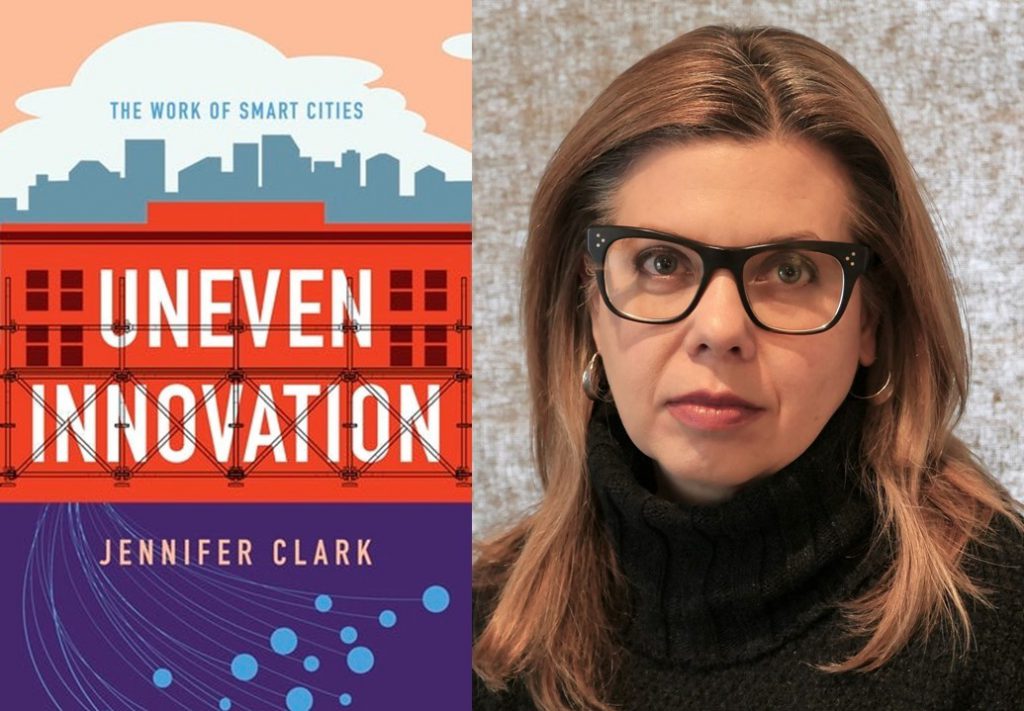
“Uneven Innovation problematizes the smart city project, showing us the many ways that it continues—rather than disrupts—underlying patterns of inequality, precariousness, and powerlessness. Clark’s insightful critique is not only a call for action, her work draws to light the ‘operational standards’ that all cities should be pushed to uphold when engaging the latest urban development fad. An essential read for practitioners, activists, and scholars seeking to understand and shape the role of technology on the future of cities and the urban workforce.”
~Nichola Lowe, University of North Carolina, Chapel Hill
In yesterday’s post, Jennifer Clark considered the roles of policy and technology in urban planning and the smart cities project. We continue this conversation today, with a Q&A in which Clark discusses the arguments is her new book, Uneven Innovation: The Work of Smart Cities.
Q: In one of the last articles marking the end of The Guardian Cities six-year project, the editors presented the case making low-tech ‘dumb’ cities instead of ‘smart’ ones, is there a good case for low-tech rather than high-tech cities?
Jennifer Clark: The assumption that all tech is good tech enabling improved outcomes is naïve at best and manipulative at worst. That said, there is also a tendency to fetishize the familiar as simpler and safer. Here is where things get complicated: different communities will want, and perhaps should have, a different array of high tech and low tech systems. There will be variation. How we determine the mechanisms by which local tailoring occurs and under what conditions has profound implications for urban planning and economic development.
Q: Your book challenges the assumption that the distributional consequences of urban innovation will be, on the whole, positive. Instead you suggest that uneven innovation is the likely outcome of the smart cities project. Why can’t smart cities be good?
JC: The question is whether we are designing smart cities for customers or for citizens.Urban innovation is, on the whole, likely good. There is a dramatic need for significant investment in urban infrastructure and a sustained upgrading of urban public systems. However, these are public systems, public spaces, public services. The addition of novel technologies does not alter the fundamental terms of a longstanding debate about the extent to which the private sector can or should be relied upon to provide services to citizens, regardless of their economic status.
----------------------------------------------------------------------------------------------------------------------
RELATED CONTENT ON THIS BLOG
 Building the Mesa Smart City -
Building the Mesa Smart City -
Citizen Innovator Workshop Oct. 25

Absolutely no doubt about it now - the data and the facts are in to show that the City of Mesa schools (and millions of taxpayer dollars spent on the largest public education system in the entire State of Arizona) is falling behind NOT moving ahead to the next level when it comes to intelligence and job skills. With a huge budget employing thousands it's the Big Patronage Gravy Train (with some exceptions) that's failed for generations to deliver satisfactory outcomes to educate students on every level across the board. Taxpayers are getting short-changed . . . Just keeping you informed as usual here on this blog. It's all in good faith to encourage overdue changes; take some action, folks > it's up to you!
__________________________________________________________________________________
 "Cities around the globe are making efforts to become smart cities and Mesa is on the front edge of this next technology era."
"Cities around the globe are making efforts to become smart cities and Mesa is on the front edge of this next technology era." 




No comments:
Post a Comment